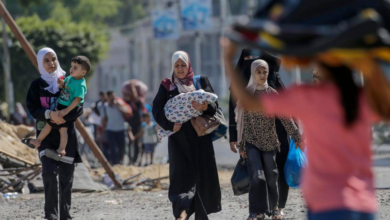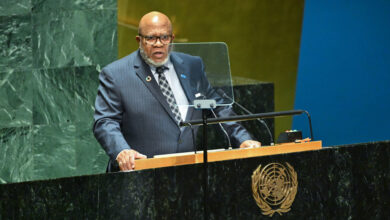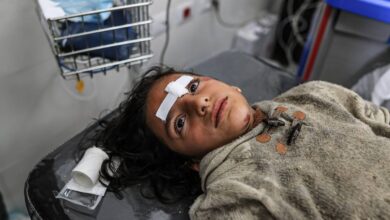
More than 576,600 people in the besieged Palestinian enclave of Gaza are facing “catastrophic hunger,” a UN report said on Thursday, Anadolu Agency reports.
“The entire population of Gaza – roughly 2.2 million people – are in crisis or worse levels of acute food insecurity,” according to the Integrated Food Security Phase Classification (IPC) report that included data from the World Food Program (WFP), other UN agencies and non-governmental organisations.
IPC is a multi-stakeholder platform that analyses data to determine the severity and magnitude of hunger crises in accordance with internationally recognised scientific standards.
The report said that 26% of Gazans, which is about 576,600 people, have “exhausted their food supplies and coping capacities and face catastrophic hunger (IPC Phase 5) and starvation.”
Cindy McCain, the WFP’s executive director, said: “WFP has warned of this coming catastrophe for weeks. Tragically, without the safe, consistent access we have been calling for, the situation is desperate, and no one in Gaza is safe from starvation.”
If the current situation of “intense conflict and restricted humanitarian access persists,” the IPC predicted that there is a “risk of famine occurring within the next six months.”
WFP food security experts had already established that Gazans have “used up all their resources, livelihoods have collapsed, bakeries are destroyed, shops are empty, and families can’t find food,” the report said.
People told WFP staff that they often go entire days without eating and that many adults go hungry so that children can eat, it added.
“These are not just numbers – there are individual children, women and men behind these alarming statistics,” said WFP Chief Economist Arif Husain. “The complexity, magnitude and speed that this crisis has unfolded is unprecedented.”
The report emphasised that more emergency food and multi-sectoral assistance is essential to prevent widespread deaths.
“The recent seven-day pause highlighted that WFP and partners can provide assistance when the conditions allow, and the re-opening of the Kerem Shalom border crossing sets the stage for more food and other relief supplies to flow into Gaza,” it said.
Reiterating the call for a humanitarian cease-fire, McCain said: “We cannot stand by and watch people starve. Humanitarian access is needed now for supplies to flow into and throughout Gaza and for civilians to safely receive life-saving aid.”
On Dec. 12, Israel decided to open its border crossing in Kerem Shalom for direct delivery of humanitarian assistance to Palestinian civilians in Gaza.
The Kerem Shalom crossing, also called Karm Abu Salem by the Palestinians, is Gaza’s only commercial crossing. More than 60% of aid to Gaza used to go through the terminal before the outbreak of the current conflict.
Israel has pounded the Gaza Strip since the Oct. 7 attack by Hamas, killing nearly 20,000 Palestinians, mostly women and children, and injuring more than 52,000 others, according to health authorities in the enclave.
There has also been widespread destruction of homes and other infrastructure, besides a shortage of food, water and medicines.
Israel says 1,200 people were killed in the Oct. 7 attack by Hamas.





